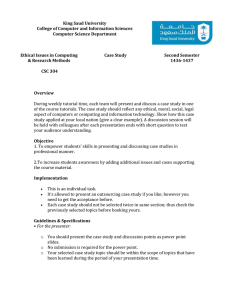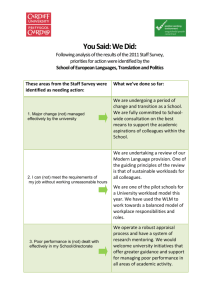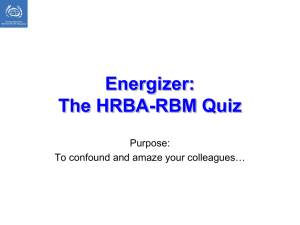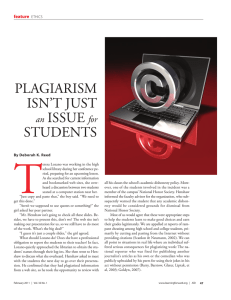Because faculty associates work with students ranging in age from
advertisement
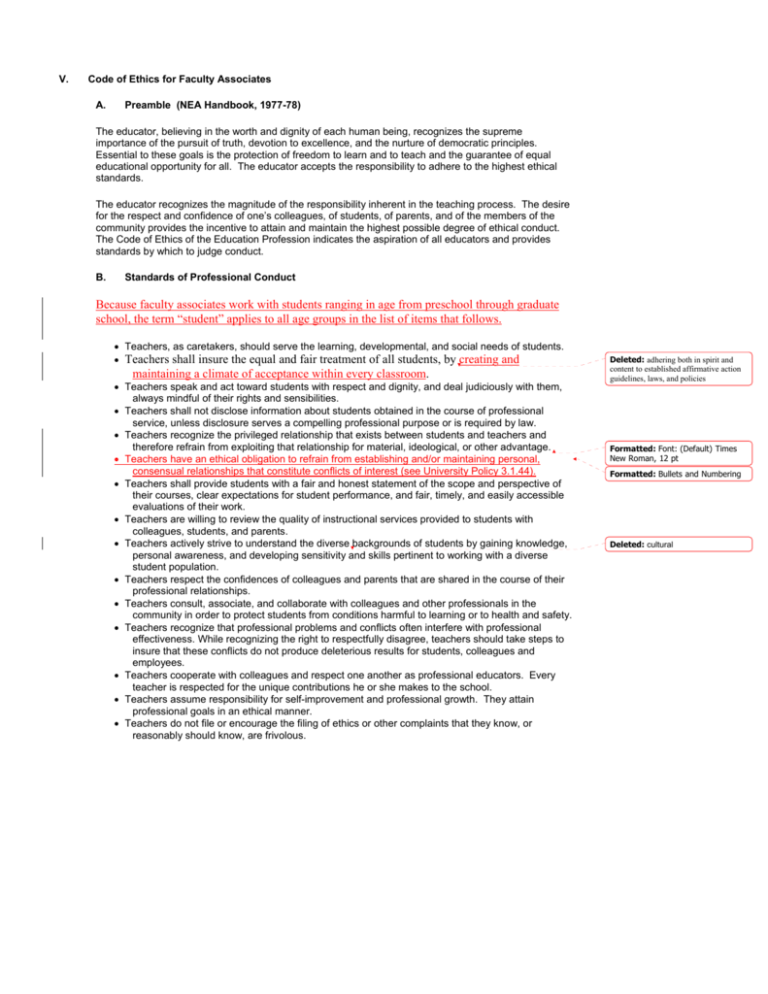
V. Code of Ethics for Faculty Associates A. Preamble (NEA Handbook, 1977-78) The educator, believing in the worth and dignity of each human being, recognizes the supreme importance of the pursuit of truth, devotion to excellence, and the nurture of democratic principles. Essential to these goals is the protection of freedom to learn and to teach and the guarantee of equal educational opportunity for all. The educator accepts the responsibility to adhere to the highest ethical standards. The educator recognizes the magnitude of the responsibility inherent in the teaching process. The desire for the respect and confidence of one’s colleagues, of students, of parents, and of the members of the community provides the incentive to attain and maintain the highest possible degree of ethical conduct. The Code of Ethics of the Education Profession indicates the aspiration of all educators and provides standards by which to judge conduct. B. Standards of Professional Conduct Because faculty associates work with students ranging in age from preschool through graduate school, the term “student” applies to all age groups in the list of items that follows. • Teachers, as caretakers, should serve the learning, developmental, and social needs of students. • Teachers shall insure the equal and fair treatment of all students, by creating and maintaining a climate of acceptance within every classroom. • Teachers speak and act toward students with respect and dignity, and deal judiciously with them, always mindful of their rights and sensibilities. • Teachers shall not disclose information about students obtained in the course of professional service, unless disclosure serves a compelling professional purpose or is required by law. • Teachers recognize the privileged relationship that exists between students and teachers and therefore refrain from exploiting that relationship for material, ideological, or other advantage. • Teachers have an ethical obligation to refrain from establishing and/or maintaining personal, consensual relationships that constitute conflicts of interest (see University Policy 3.1.44). • Teachers shall provide students with a fair and honest statement of the scope and perspective of their courses, clear expectations for student performance, and fair, timely, and easily accessible evaluations of their work. • Teachers are willing to review the quality of instructional services provided to students with colleagues, students, and parents. • Teachers actively strive to understand the diverse backgrounds of students by gaining knowledge, personal awareness, and developing sensitivity and skills pertinent to working with a diverse student population. • Teachers respect the confidences of colleagues and parents that are shared in the course of their professional relationships. • Teachers consult, associate, and collaborate with colleagues and other professionals in the community in order to protect students from conditions harmful to learning or to health and safety. • Teachers recognize that professional problems and conflicts often interfere with professional effectiveness. While recognizing the right to respectfully disagree, teachers should take steps to insure that these conflicts do not produce deleterious results for students, colleagues and employees. • Teachers cooperate with colleagues and respect one another as professional educators. Every teacher is respected for the unique contributions he or she makes to the school. • Teachers assume responsibility for self-improvement and professional growth. They attain professional goals in an ethical manner. • Teachers do not file or encourage the filing of ethics or other complaints that they know, or reasonably should know, are frivolous. Deleted: adhering both in spirit and content to established affirmative action guidelines, laws, and policies Formatted: Font: (Default) Times New Roman, 12 pt Formatted: Bullets and Numbering Deleted: cultural
